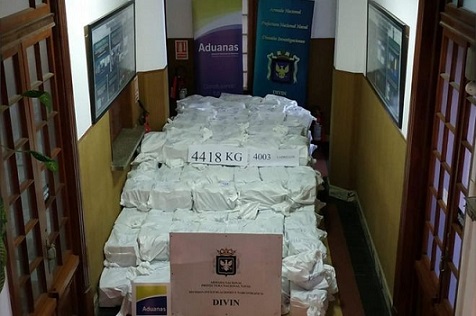
Uruguay’s authorities say they have seized a record haul of 4.4 tonnes of cocaine, calling it the biggest setback for drug traffickers in the country’s history.
The cocaine was confiscated in a joint operation between navy and customs officers in the port of Montevideo.
It had been hidden in four soy flour containers destined for Lome, the capital of Togo.
The drugs had a street value of about $1bn (£765m), according to officials.
Uruguay is increasingly being used as a transit point to move drugs from Latin America to Africa and Europe.
The country’s previous record haul was in November, when authorities uncovered a container with three tonnes of cocaine, also in Montevideo, bound for Cotonou in Benin via the Spanish island of Tenerife.
The 4.4 tonnes found recently came to light when scanners at Montevideo’s port showed “anomalies” in the containers, officials said.
Navy spokesman Diego Perona told journalists that the first container was found to contain more than 3,000 “bricks” of cocaine each weighing 1.1kg (2.4lb). The containers were due to be loaded on to an Italian-registered ship, local media reported.
Uruguay’s customs director Jaime Borgiani said it was not known exactly where the cocaine had originated but that it was loaded on to trucks on Tuesday at a ranch in the south-western Soriano department, 290km (180 miles) from Montevideo.
On Twitter, the interior ministry said police had raided the ranch and arrested the owner and his son. A quantity of unspecified drugs was also confiscated, it added.
“The important thing is to show the world and drug traffickers that you don’t mess around with Uruguayan customs,” Mr Borgiani said. “We’ve taken the necessary steps to rid the country of this scourge.”
A year of major drugs seizures
There has been a surge in the availability of cocaine due to a huge increase in global cultivation of the coca leaf plant, which is at its highest level for almost 20 years.
Earlier this year the EU drugs agency warned that European authorities were seizing record quantities of increasingly pure cocaine, while enterprising criminals were setting up “cocaine call centres” to provide fast and flexible delivery services.
Issues such as the use of large shipping containers to transport cocaine were proving a major challenge, the European Monitoring Centre for Drugs and Drugs Addiction (EMCDDA) said.
- In August customs officials in the German city of Hamburg found more than 4 tonnes of cocaine with a street value of about €1bn (1.1bn; £850m) during a routine check. The shipment was being transported from Montevideo in Uruguay to Belgium. It was listed as soya beans and the drugs were hidden in sports bags inside the shipping container
- In June, Australian authorities seized the nation’s largest-ever haul of methamphetamine. The 1.6 tonnes of the drug, with an estimated street value of A$1.2bn (£660m; $840m), were found hidden inside stereo speakers in a shipment at a Melbourne port. The consignment had come from Thailand
- In September nearly 1.3 tonnes of heroin with a street value of £120m ($155m) was found concealed in towels and bathrobes on a container ship in the UK’s largest ever seizure of the drug.
Source: bbc.co.uk






Be the first to comment